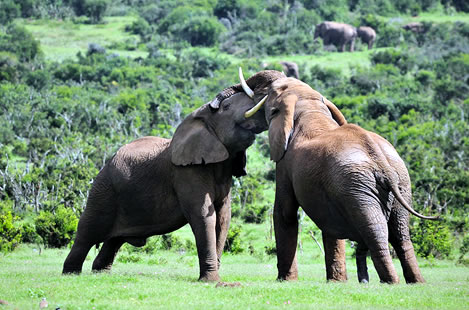Nov. 2001 Proverb: ” When elephants fight the grass (reeds) gets hurt.” – Swahili ( Eastern and Central Africa ), Also Gikuyu ( Kenya), Kuria ( Kenya/Tanzania), Ngoreme (Tanzania)
November, 2001
When elephants fight the grass (reeds) gets hurt. (English)

Swahili ( Eastern and Central Africa ) Proverb
Also Gikuyu ( Kenya), Kuria ( Kenya/Tanzania),
Ngoreme ( Tanzania )
Background, Explanation, Meaning and Everyday Use
There are different wordings of this very popular Swahili proverb. For example, the words on a khanga, a colorful African cloth: Ndovu wawili wakisongana, ziumiazo ni nyika (When elephants jostle, what gets hurt is the grass). There are many versions of this proverb in other African languages such as When two bulls [male cows, goats, sheep] fight the grass gets hurt (Kikuyu, Kenya, Kuria, Kenya/Tanzania and Ngoreme, Tanzania), but they all mean the same thing: the feeling of powerlessness in the midst of larger forces. While the mating period could be one of the contexts of the trampling of the grass, it could occur at other times too, for example, when two bull elephants are fighting over a female or over the leadership of the herd.
The proverb is used regularly to describe local officials and leaders whose disputes and divisions end up hurting innocent and powerless people. Village leaders can manipulate and exploit the local people in the name of government policy or ethnic group customs. A related proverb is That which eats you up is your clothes [or the thing nearest to you]. Various practices in the local community itself, such as the practice of witchcraft and the invocation of evil spirits and curses, oppress the people.
In Africa and worldwide this is probably the most commonly used Swahili proverb that is translated into English. It is very relevant in many situations and contexts. Here are some of its many uses:
- In the 1970s Julius Nyerere (then the President of Tanzania) used this proverb in a speech at the United Nations in New York. The Democratic Republic of the Congo (then Zaire) Ambassador to Great Britain used this same proverb in a talk to a group of Missionaries of Africa (White Fathers) in London. The meaning was the same: In the Cold War between the (then) two great super powers — the United States and Russia — it was the poor Third World countries such as those in Africa who suffered and were victimized.
- The proverb was used about Somalia in 1992-1994: When the local warlords fought for power, it was local Somalia people who suffered and went without food.
- In Burundi the proverb has been applied to the rival armies allied to political parties who force “boy soldiers” into their armies.
- In the 22-28 January, 2001 issue of The EastAfrican published in Nairobi, Kenya a banner on the top of page 1 stated: “Elephants fight.” Then a full-page article on politics on page 5 was entitled “When Moi and Nyachae Fought, Kisii Was Trampled.”
Another important aspect of African proverbs is their participatory nature that fits in very well with relationship and community values. Sometimes a preacher or teacher gives the first half of the proverb and the congregation or audience responds with the second half: When elephants fight…the grass gets hurt. The second half is the advice that the speaker wants the audience to accept so he or she “maneuvers” the listeners so that the words come from their own lips.
 Biblical Parallels
Biblical Parallels
In the Old Testament there are various examples of leaders and important people fighting among themselves and causing suffering to other people especially “little” people, for example, Cain and Abel, Saul and David, etc.
In Matthew 23:1-36 Jesus Christ castigates the scribes and Pharisees as hypocrites, blind guides and blind fools for vying for places of honor at banquets and the best seats in the synagogues, but oppressing the ordinary people:
“They tie up heavy burdens, hard to bear, and lay them on the shoulders of others; but they themselves are unwilling to lift a finger to move them (4).”
“For you lock people out of the kingdom of heaven. For you do not go in yourselves, and when others are going in, you stop them (13, 14).”
Contemporary Use and Religious Application
A visitor to our African Proverbs, Sayings and Stories Website wrote: “When elephants mate, it’s the grass that suffers.” Humorously appropriate, in this age of mergers, consolidations and takeovers!”
A man from California wrote: “I discovered the ‘elephant’ proverb in Bartlett’s Book of Quotations and it spoke loud and clear to me about a political situation I was witnessing in my own volunteer work where two individuals who were well-endowed with strong personalities were in conflict and making it difficult for the rest of us to do our work. The quotation made me smile and help lighten my attitude toward the, “thankfully,” temporary situation.
Applied to Muslim-Christian relationships this proverb reminds us of the fact that often the tensions between Muslims and Christians refer to a power struggle between the religious leaders themselves, a power struggle in which the ordinary faithful are the victims.
People in positions of power and control can do well to examine themselves in relation to the implications of this Swahili proverb. Even when parents quarrel or fight it is the children that suffer.
This famous African proverb was recently restated in a syndicated column in a Tanzanian newspaper in these words: When Northern (Europe and the USA) elephants fight over GMOs (genetically modified organisms), the grass that is African countries gets trampled.
NOTE: See the references to this proverb on pages 36-37 and 42 in Towards An African Narrative Theology and on pages xii and 126 in A Fifth Gospel: The Experience of Black Christian Values.
Rev. Joseph G. Healey, M.M.
Nairobi, Kenya
